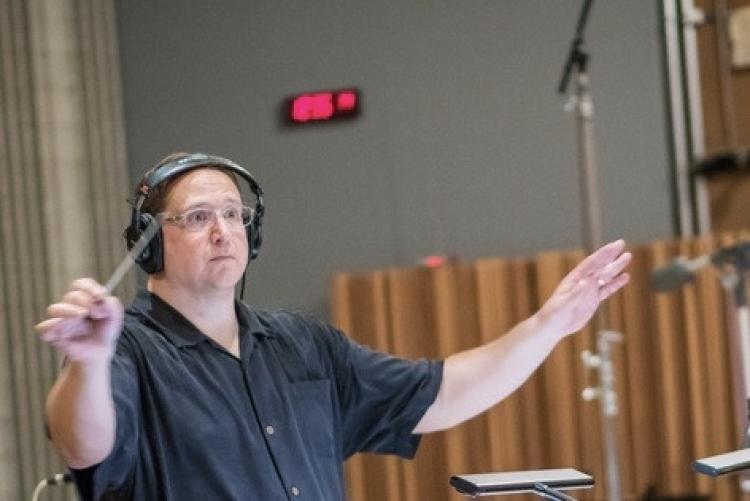Alumni Spotlight: Carl Rydlund

College of Music Alumni Carl Rydlund
Since completing a bachelor’s in music at the CU Boulder College of Music, composer, orchestrator, arranger, conductor and guitarist Carl Rydlund (Guitar, ’89) hasn’t missed a beat.
Continuing his education at the Grove School of Music (composition, film composition and arrangement) and privately (more composition, along with orchestration, conducting and guitar), Rydlund thrived in Los Angeles. He started performing for record, TV and film dates on guitar, and worked as an arranger and copyist at Joann Kane Music and Disney.
“During the last 10 years or so, I’ve been focusing on film and live orchestral work as an arranger and orchestrator, conductor and guitarist,” he says. Indeed, his broad experience makes him one of the most sought-after studio musicians in Los Angeles with credits that comprise everything from video games and TV series to a long list of films—from “Life of Pi” and “Batman” films to “Inception,” “Dunkirk,” “The Matrix” and “Toy Story 2” to “Unfaithful,” “What Women Want” and “101 Dalmatians” to hundreds more familiar titles. Not to mention, his concert credits—and credits for albums and live performances—include, among others, Hans Zimmer Live, Interstellar Live at Royal Albert Hall, the 2012 Academy Awards and Barbra Streisand’s “A Christmas Album” and “Timeless” live performance; as well as various stints as arranger and composer for the Boston Symphony Orchestra and the erstwhile Denver Symphony Orchestra.
Rydlund recalls making crucial career connections as a student at the College of Music. “I probably wouldn’t be where I am today without making good connections along the way,” he says. Specifically, having studied with William "Doc” Fowler at CU led to connecting with his son, Bruce Fowler, who happened to be Hans Zimmer’s lead orchestrator. “When the opportunity arose to work with Hans, Bruce gave me the benefit of the doubt because I had studied with his dad at CU.”
That said, Rydlund’s original plan wasn’t to land in Los Angeles—rather, The Juilliard School. “For a kid from Denver, going to New York in the mid-80s was a hair-raising experience,” he says. “I auditioned on clarinet, but also said I might want to minor in guitar.
“I was told I’d be offered a full ride on clarinet, but that the guitar was—literally—‘not a musical instrument.’ So I decided to check out CU because it seemed like a better fit for me, and I was still close enough to home to play in my dad’s band on the weekends and do local session work.”
Rydlund says he appreciated the “open, progressive nature” of the College of Music that allowed him to follow his interests in composition, clarinet … and guitar. He also benefited from the then-nascent music business program “when no one else was talking about that aspect of having a career in music.
“Besides Doc Fowler’s huge influence on me, the College of Music also created an environment to learn from guest artists that Doc Fowler brought in, who were active in the business and who could really talk about what it’s like in LA,” adds Rydlund.
But he doesn’t sugarcoat the challenges of his chosen career path. “The tough news is that it’s becoming more challenging for people to find work in the studios the way I did when I came to LA. But on the positive side, there are no rules or ladders to climb now.
“It used to be that you started out as I did—as a player, proofreader or copyist and then became an orchestrator, then a conductor and composer—which is the path I’m still on. But today, that’s changed. If you want to be a composer, you can just go out and do that. Because there are no rules, you might as well do what you want to do from the outset.”
Concludes Rydlund, “I am the biggest proponent of making a living at this. To do so, you have to get to a point where you are so good at your craft—at solving problems and meeting challenges. From the time I wake up in the morning, my job is providing solutions … and I love that.”


